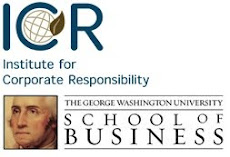The first module is over! I have to admit, amongst the hustle and bustle, I am glad to be back at school. The classroom has truly been a knowledgeable experience and it is interesting to see the relevance of business concepts after being in the working world, but also through the realization of my ultimate career goals.
Of my courses from this module, Business Ethics has been the most pertinent in terms of the PRME objectives. Before we even began the course, we were asked to submit a list of 5-7 values that we believed were most important for a successful business. After collecting almost 120 sets of values, the following were the “election results” – Honesty, Respect, Dedication, Innovation, Collaboration, Moral/Ethical/Sustainable, Leadership and Passion. From the outset, it is clear that the purpose and values of this course aligns with those outlined in the Certificate.
The goals of the course were stated as the following: (1) to clarify values, (2) to create ethical awareness, (3) to develop a moral decision-making process, and (4) to learn the central steps in creating ethical business communities that tend to enhance peace and security. These goals are in line with the objective of “Purpose” as the course aims to provide students with an educational framework around ethics in a business environment, and promotes us (as future business leaders) to think scenarios through the main ethical theories pertaining to Shareholders, Stakeholders and Virtues. This was the “Method” through which the course is communicated. Using various real-life cases and scenarios, we were encouraged to use this structure to decipher clear and sound ethical and sustainable decisions.
However, the core of this class came from the “Research” portion as the majority of our final grade is determined by a research paper based on an actual case where a company was faced with an ethical dilemma. Through this intense research, students were able to advance our understanding of the three theories which incorporate “the role, dynamics, and impact of corporations in the creation of sustainable social, environmental and economic value.” My collaborative paper was an incident that the Coca-Cola Company faced against child labor in El Salvador. Through this paper, I was able to explore business decisions the corporation had to make, and the impacts these decisions had on the shareholders and stakeholders. Specifically, the paper’s contents dealt with the first 6 principles that are mentioned in the United Nations Global Compact in terms of “Human Rights” and “Labor”.
Through “Partnership” and “Dialogue” with fellow classmates (and thus former business professionals) as well as Tim Fort (our primary educator in this course) our discussions and debates allowed appreciation of different viewpoints and possibly different ethical frameworks. Especially through the real-life case discussions, we learnt, understood and challenged social responsibilities of corporations, the power of individual and collective values and attitudes within corporations as well as the sustainable precedents set with decisions made in ethical dilemmas.
Tim Fort as a professor is also extremely engaging. He clearly has passion for his subject and is enthusiastic about passing his experiences and learning to the students. I highly recommend this course, even for those who think ethics cannot be taught in a classroom setting. The class will at the least, allow you to acknowledge your own ethics and think about them in a business setting.
Priyanka Tayal, Global MBA 2011





No comments:
Post a Comment